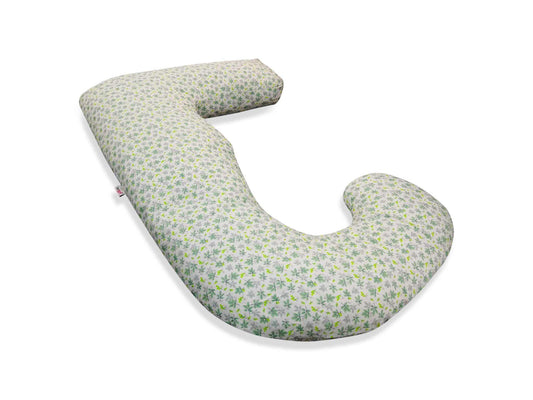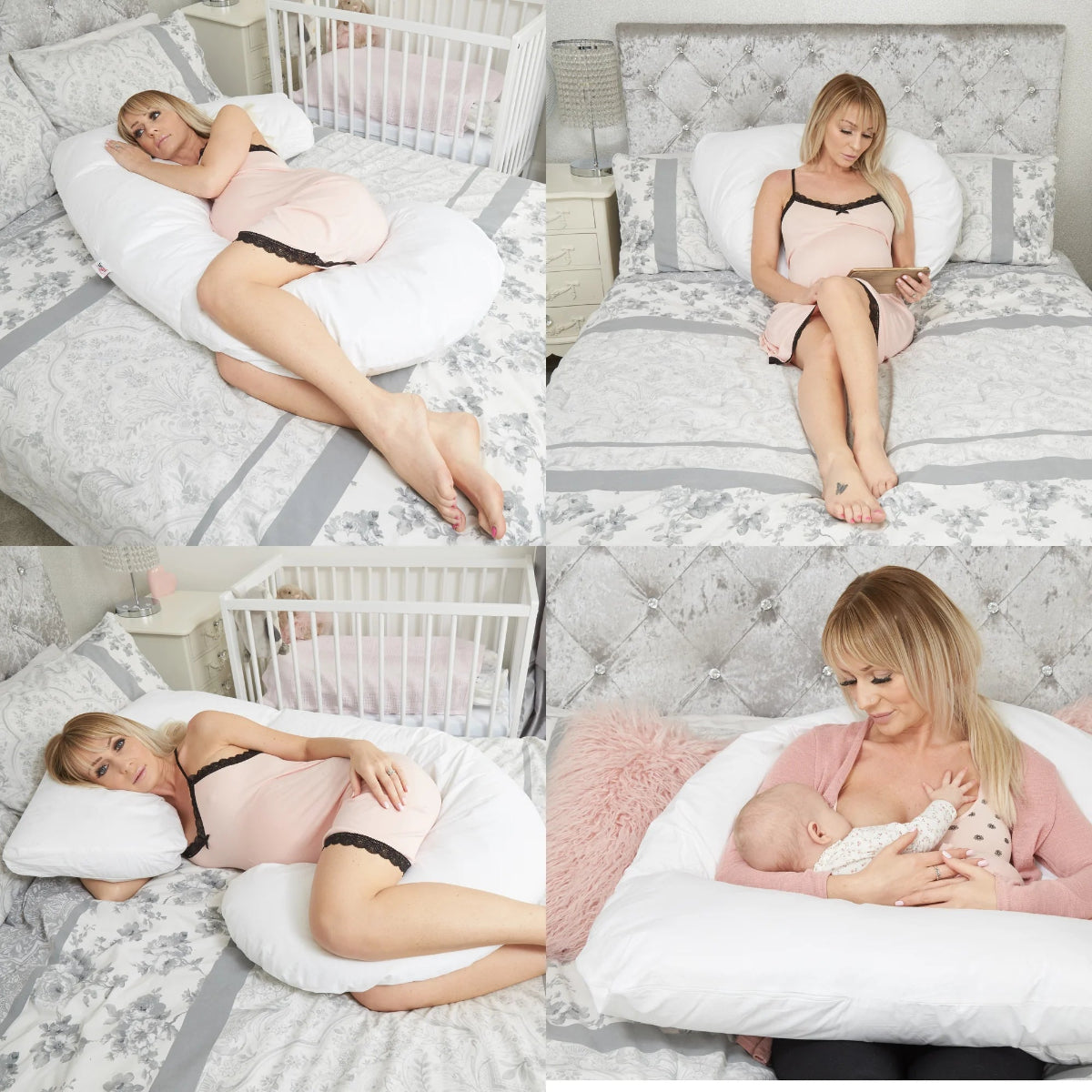Mi sono sentita in colpa a tornare a lavoro 27 anni fa. Molte mamme lo sono ancora.

La colpa di cui nessuno parla: maternità, lavoro e i momenti che ci perdiamo
La colpa era reale
Sono tornata al lavoro 27 anni fa dopo la nascita di mio figlio, e ricordo ancora quanto fosse pesante quel senso di colpa. Non era solo l’ansia di stare lontana da un neonato—era qualcosa di più profondo. Non avevo famiglia nelle vicinanze, lo stipendio di mio marito non poteva coprire tutto, e restare a casa a tempo pieno semplicemente non era un’opzione.
Il mio lavoro non era un ruolo di convenienza—era tecnico, dominato dagli uomini, a tempo pieno e frenetico. Non c’erano rientri graduali o giorni in remoto: o tornavi completamente, o non tornavi affatto. E sebbene amassi il lavoro—mi offriva sfide e senso—la colpa si acuiva per il contrasto tra due identità in competizione.
Mi sentivo divisa. Volevo essere pienamente presente con mio figlio, ma avevo anche bisogno della stimolazione e della struttura che il mio lavoro mi dava. Mi dava concentrazione, uno scopo e la sensazione di chi ero al di fuori della maternità. Ma nel 1999 non c’era una vera conversazione sull’equilibrio lavoro-vita, nessun diritto legale per richiedere lavoro flessibile e certamente nessun discorso aperto sulla “colpa materna”. Se volevi lavorare—e amavi comunque tuo figlio—spesso eri sola in quella contraddizione.
Ricordo di aver cercato assistenza per l’infanzia e di aver chiesto a amici e conoscenti se conoscevano babysitter affidabili. Una signora più anziana—lei stessa nonna—mi disse: “Non lascerei il mio bambino con nessuno.” Fu detto con gentilezza, ma mi colpì duramente. Lei non lavorava, e i suoi figli potevano contare su di lei e suo marito. Quella non era la mia realtà. Non avevo quel tipo di rete di sicurezza. E sentirlo mi fece sentire, per un momento, come se stessi facendo qualcosa di sbagliato solo per aver bisogno di aiuto. Quel genere di giudizio silenzioso—per quanto non intenzionale—mi rimase dentro..
Che sia per aver perso una nanna o per aver scelto di restare un po’ più a lungo in ufficio—non sei sola. Condividi i tuoi pensieri nei commenti o invialo a qualcuno che deve sentirlo.
Progresso nel Regno Unito: Molto meglio di prima — ma la colpa persiste
Avanti veloce fino a oggi, e è chiaro che il panorama per le madri lavoratrici nel Regno Unito è molto migliore rispetto a 27 anni fa. Ora esistono tutele legali. Dal 2024, tutti i dipendenti possono richiedere lavoro flessibile fin dal primo giorno di impiego. È disponibile il congedo parentale condiviso. Molti datori di lavoro offrono opzioni remote o ibride, rientri graduali e supporto strutturato per i genitori che rientrano. In alcuni ambienti di lavoro, le conversazioni sull’equilibrio lavoro-vita non sono solo incoraggiate—sono attese.
Per molte donne, questo ha fatto una vera differenza. C’è più apertura, più scelte e più infrastrutture che mai. Non è più insolito parlare di reintegrazione, salute mentale o anche di colpa materna in contesti professionali. Non è perfetto, ma è progresso.
Allora perché tante mamme si sentono ancora in colpa?
Perché la colpa non riguarda solo le politiche—riguarda le persone. Riguarda ciò che crediamo renda una “buona madre”. Riguarda come ci confrontiamo con gli altri. Riguarda l’essere lodate per la resilienza, ma comunque giudicate in silenzio quando diamo priorità ai nostri obiettivi. Anche con il supporto, molte donne sentono ancora di dover giustificare il ritorno al lavoro—soprattutto se lo apprezzano. Oggi la colpa riguarda meno se possiamo lavorare e più come ci sentiamo quando lo facciamo.
Quindi sì, abbiamo fatto molta strada. Ma la colpa non è svanita. Si è solo trasformata. E per molte madri, quel peso emotivo le segue silenziosamente al lavoro—a prescindere da quanto progressiva possa essere la politica.
Il carico emotivo: la colpa oggi non è sparita
Nonostante i progressi nelle politiche e la consapevolezza pubblica, molte madri moderne portano ancora un peso silenzioso. La colpa non è scomparsa. Ha solo assunto nuove forme. Un sondaggio del 2023 di Bright Horizons ha rilevato che il 65% delle mamme lavoratrici si sente in colpa per non trascorrere abbastanza tempo con i propri figli, anche quando si sentono supportate al lavoro [source]. Quella colpa non riguarda necessariamente l’amare i propri figli a sufficienza; in molti casi deriva dal piacere per il proprio lavoro, dal bisogno di tempo per sé o dal desiderio di qualcosa oltre alla maternità che dia un senso di identità.
Secondo uno studio di Pregnant Then Screwed, il 35% delle madri che tornano al lavoro ha detto che la propria situazione era insostenibile, e quasi la metà ha preso in considerazione di licenziarsi del tutto [source]. Un altro rapporto di HR Magazine ha rivelato che oltre il 50% delle madri lavoratrici era scontenta di come era stato gestito il loro rientro [source].
Non si tratta di mancanza di cura—spesso si tratta di mancanza di sfumature. Molti luoghi di lavoro offrono politiche ma ignorano la transizione emotiva. Ed è lì che la colpa si insinua.
La verità è che, anche quando il supporto pratico c’è, quello emotivo spesso manca. Ed è questo che lascia le donne a chiedersi: Sto facendo la cosa giusta? Sono abbastanza presente? Dovrei stare più a casa? Queste non sono sempre domande razionali—sono emotive, plasmate dalla cultura, dall’educazione, dai social media e dalle aspettative che abbiamo interiorizzato nel tempo. In questo senso, il divario non è solo tra politica e pratica—è tra logica e sentimento. E colmare questo richiede più di un modulo per orari flessibili.
Perché la colpa persiste: è culturale, profonda e ancora molto reale
Anche con i progressi nei diritti e nella flessibilità, la colpa che molte madri portano oggi non riguarda sempre il lato pratico del lavoro. Non è solo perdere una nanna o non fare ogni volta il ritiro a scuola. Va più a fondo. È emotiva, culturale e spesso interiorizzata nel corso degli anni. Ecco perché è così difficile liberarsene.
Parte del problema è il peso delle aspettative interiori. Molte donne crescono pensando di dover essere tutto per tutti—la lavoratrice affidabile, la mamma devota, la partner di supporto. E quando quei ruoli competono, qualcosa deve cedere. Spesso è il tempo con i figli—ed è lì che la colpa comincia a radicarsi.
C’è anche la necessità di dimostrare il proprio valore, specialmente in settori dominati dagli uomini. Anche oggi, le donne che rientrano dal congedo di maternità sentono spesso la pressione di dimostrare di non aver perso il loro smalto, che sono ancora determinate, capaci e competitive come prima. Quella pressione può trasformare ogni richiesta di flessibilità in una negoziazione—non solo con il datore di lavoro, ma con se stesse.
Poi c’è la tensione emotiva di amare profondamente sia il lavoro che il proprio figlio. La società ancora promuove una narrativa sottile che se ci tenessi davvero, vorresti stare a casa. Quindi quando ti piace lavorare, o ti senti di nuovo te stessa dopo il rientro, può accompagnarsi a uno strato di colpa silenziosa—come se avessi tradito un ruolo che avresti dovuto incarnare completamente.
E sotto tutto questo c’è la lotta tra identità e intimità—tra mantenere chi sei come donna, professionista o creativa, e essere il genitore sempre disponibile fisicamente ed emotivamente. Questo non è qualcosa che una politica aziendale da sola possa risolvere. È qualcosa di cui bisogna parlare, sfidare e rimodellare collettivamente.
Uno studio ha scoperto che il lavoro flessibile può ridurre il divario salariale da maternità fino al 68% [source]. Eppure molte mamme esitano ancora a chiedere flessibilità perché temono che possa riflettersi negativamente sul loro impegno. Altre passano a un lavoro part-time e poi si trovano escluse dallo sviluppo di carriera, dai bonus o dai percorsi di leadership—approfondendo il divario tra partecipazione e progresso [source].
Tutto questo rafforza un messaggio doloroso: fare un passo indietro, anche per buone ragioni, può comunque sembrare una retrocessione. Ed è questo che rende la colpa così difficile da affrontare—non è sempre logica. È emotiva, culturale e spesso rinforzata silenziosamente in modi di cui non parliamo abbastanza.
A livello globale: chi lo fa bene?
Quando si tratta di bilanciare lavoro e genitorialità, alcuni paesi sono più avanti. Vediamo alcuni esempi di rilievo e come si confrontano con il Regno Unito:
Svezia: Offre fino a 480 giorni di congedo parentale pagato per figlio, con 90 giorni riservati a ciascun genitore per incoraggiare la responsabilità condivisa. I genitori possono anche ridurre l’orario di lavoro fino a che il loro bambino compie otto anni. Congedo parentale nel mondo:
Un rapido confronto
Curioso di sapere come altri paesi supportano i genitori lavoratori? Ecco un rapido sguardo con link per saperne di più:
| Paese | Offerta di congedo parentale |
|---|---|
| 🇸🇪 Svezia | 480 giorni in totale; 90 riservati per genitore |
| 🇳🇴 Norvegia | Fino a 1 anno di congedo pagato; forte adesione paterna |
| 🇮🇸 Islanda | 6 mesi per genitore; 80% dello stipendio |
| 🇫🇮 Finlandia | 160 giorni per ciascun genitore; condivisione flessibile |
| 🇪🇸 Spagna & 🇵🇱 Polonia | Tra le migliori in UE per durata e retribuzione; forte sostegno statale |
| 🇳🇿 Nuova Zelanda | 26 settimane pagate; programmi di rientro di supporto |
| 🇸🇬 Singapore (2025) | 30 settimane di congedo pagato per entrambi i genitori |
Norvegia: Offre un anno intero di congedo parentale pagato, con una quota dedicata ai padri. Entrambi i genitori sono incoraggiati a prendersi tempo libero, e l’adesione tra gli uomini è elevata.
Islanda: Offre sei mesi di congedo per ciascun genitore, pagati all’80% del reddito, e il congedo deve essere utilizzato o si perde. Questo ha portato oltre il 90% dei padri a prendere l’intero congedo.
Finlandia: Ha recentemente riformato la politica per offrire 160 giorni di congedo per genitore, con maggiore flessibilità su come il tempo viene condiviso.
Spagna e Polonia: Guidano le classifiche UE per generosità e durata del congedo, con forte finanziamento statale e protezione per entrambi i genitori.
Nuova Zelanda: Offre 26 settimane di congedo parentale pagato e ha una cultura che supporta le transizioni di rientro al lavoro tramite iniziative governative e dei datori di lavoro.
Singapore: Dal 2025, Singapore imporrà 30 settimane di congedo pagato per entrambi i genitori, rappresentando un grande passo verso l’uguaglianza e la responsabilità condivisa.
In confronto, il Regno Unito attualmente offre 52 settimane di congedo di maternità, ma solo 39 settimane sono pagate—e non sempre al pieno stipendio. Il congedo parentale condiviso è disponibile, ma l’adesione rimane bassa, in particolare tra i padri, a causa di barriere culturali e finanziarie.
Ciò che distingue molti di questi paesi non è solo la durata del congedo, ma gli atteggiamenti culturali che lo accompagnano. Nei paesi nordici è normale che gli uomini prendano periodi prolungati di assenza. In altri posti, il lavoro flessibile non è un extra—è un’aspettativa. Questi sistemi rendono più facile per i genitori condividere la cura e tornare al lavoro senza colpa o paura della perdita della carriera.
Per il Regno Unito, migliorare significa non solo offrire tempo—ma sostenere ciò che quel tempo rappresenta: fiducia, responsabilità condivisa e la convinzione che genitorialità e professionalità possano coesistere. I paesi con congedi paterni forti e basse penalità per il lavoro part-time mostrano una migliore uguaglianza di genere e meno penalità per le madri .
Pronta per preparare la borsa per il parto? Scarica la nostra checklist stampabile con tutto ciò di cui mamme e neonati hanno davvero bisogno — niente fronzoli, solo l’essenziale.
👉 Scarica la checklist Mamma & NeonatoDatori di lavoro: perché flessibile non significa meno redditizio -
Perché ha senso per il business
Molti dirigenti temono che il lavoro flessibile danneggerà la produttività. Ma i dati raccontano un’altra storia:
- La Stanford Business School ha rilevato che i lavoratori remoti/flessibili erano 21% più produttivi Studio Stanford/McKinsey
- Un consiglio di Forbes ha trovato che il 67% delle donne resterebbe nel proprio lavoro se avesse orari flessibili .Forbes Council
- Nel Regno Unito, le aziende che abbracciano politiche family-friendly vedono un guadagno di £23 miliardi in produttività e retention dati datori di lavoro UK
- La ricerca collega le politiche di conciliazione lavoro-vita a maggiore motivazione, minore assenteismo e migliori performance ricerca sulle politiche
- Nove dipendenti su dieci in aziende supportate dicono di svolgere un lavoro più significativo quando i genitori ricevono assistenza per l’infanzia parents.com.
Il lavoro flessibile non aiuta solo i genitori—genera valore aziendale e risultati sui profitti.
Equilibrare profitto e supporto parentale: il punto ottimale
Come implementare la flessibilità e proteggere la redditività?
-
Stabilisci aspettative chiare sulle prestazioni
Concentrati sui risultati, non sul presentismo. -
Forma i manager
Incoraggia conversazioni orientate alla soluzione per le richieste di flessibilità . -
Normalizza i ruoli flessibili
Annunci di lavoro, onboarding e cultura dovrebbero segnalare che il lavoro flessibile o part-time è benvenuto. -
Programmi di supporto alla famiglia
Sussidi per la cura dei figli, job-sharing e servizi di assistenza di riserva aumentano retention e produttività thetimes.co.ukparents.com+1en.wikipedia.org+1. -
Reti di supporto tra pari
Programmi “returner” o mentoring riducono lo stress e migliorano la retention. -
Monitora risultati e ROI
Tieni sotto controllo retention, assenteismo, divario retributivo di genere e metriche di performance.
Dove ci porta tutto questo?
Abbiamo fatto molta strada da quando sono tornata in quel cantiere con il casco. I cambiamenti nelle politiche sono reali—ma emozione e cultura arrancano dietro. La colpa è ancora presente. E non solo la colpa per i momenti persi—ma la colpa per desiderare sfida, scoperta e identità.
I migliori esempi—i paesi nordici, la nuova legge di Singapore—mostrano come costruire quadri che bilancino identità, famiglia e uguaglianza. I datori di lavoro che incorporano empatia e flessibilità non solo trattengono i genitori—prosperano mantenendo i talenti.
Parliamo di noi
Perché diciamolo—la maggior parte delle mamme lavoratrici non è schiacciata dalla logistica. È perseguitata dalla sensazione di perdere momenti. Il dolore di allontanarsi mentre il tuo bambino piange, o di correre nella routine della buonanotte perché il lavoro è finito tardi. Queste idee non cancelleranno il dolore—ma possono aiutare a colmare il divario tra presenza e assenza in modo più umano.
Anche ora, decenni dopo il mio rientro al lavoro, ricordo ancora il peso di quella colpa. Vedo nuove mamme affrontare gli stessi sentimenti, e spesso ripenso a quei primi giorni—a cosa avrei voluto fosse diverso e a cosa avrei voluto poter fare di più. All’epoca, una cosa che alleviò la colpa (anche se per poco) fu organizzare una assistenza vicino al mio posto di lavoro. Significava poterle fare visita a pranzo, solo per vedere il mio bambino per qualche minuto. Ma quella scelta ebbe un costo—letteralmente. Dovetti rinunciare a qualcos’altro sul piano finanziario per far funzionare la cosa. E alla fine divenne sostenibile.
Ecco perché dobbiamo ripensare come può apparire il supporto. Alcune grandi organizzazioni offrivano asili nido in sede o spazi nido condivisi, e sebbene molti abbiano chiuso per ragioni di costo, non è forse ora di riconsiderare quell’idea? E se i datori di lavoro locali nella stessa area mettessero in pool le risorse per offrire una piccola struttura nido condivisa? Non è impossibile—è solo che non è una priorità.
Quale aiuto è già disponibile per le mamme che rientrano nel Regno Unito
Cosa è disponibile ora nel Regno Unito
Sebbene il senso di colpa emotivo pesi ancora su molte mamme lavoratrici, ci sono diritti legali e politiche pratiche in vigore progettate per supportare il tuo rientro al lavoro. Ecco cosa è disponibile in questo momento:
🌱 Dove trovare supporto
Se sei una mamma lavoratrice che affronta senso di colpa, problemi di childcare o sfide sul lavoro flessibile, non sei sola. Queste risorse basate nel Regno Unito offrono consigli affidabili, orientamento legale e strumenti pratici per aiutarti a prosperare sia a casa che al lavoro:
- Congedo di maternità statutario Hai diritto fino a 52 settimane di congedo di maternità — 26 settimane di Ordinary Maternity Leave e 26 settimane di Additional Maternity Leave. Non sei obbligata a prendere tutte le 52 settimane, ma devi prendere almeno 2 settimane dopo la nascita del bambino (4 se lavori in una fabbrica)
- Statutory Maternity Pay (SMP) Se sei idonea, riceverai il 90% della tua media delle retribuzioni settimanali (al lordo delle imposte) per le prime 6 settimane, poi £184.03 o il 90% della tua media delle retribuzioni settimanali (quanto è più basso) per le successive 33 settimane.
- Congedo parentale condiviso Tu e il tuo partner potreste essere in grado di condividere fino a 50 settimane di congedo e 37 settimane di paga. Questo può aiutare a suddividere la cura in modo più equilibrato
- Diritto di richiedere lavoro flessibile (dal primo giorno) Da aprile 2024, qualsiasi dipendente può richiedere lavoro flessibile fin dal primo giorno di impiego. I datori di lavoro devono rispondere in modo tempestivo e ragionevole, anche se possono ancora rifiutare per motivi specifici
- Giorni di contatto (KIT)Durante il congedo di maternità, puoi lavorare fino a 10 giorni pagati senza influire sulla tua maternity pay. Questo può facilitare il rientro.
- Tax-Free Childcare I genitori che lavorano possono avere diritto a fino a £2,000 all’anno, per bambino per i costi di assistenza all’infanzia.
-
Childcare gratuito per i primi anni In Inghilterra, tutti i bambini di 3 e 4 anni hanno diritto a 15 ore di childcare gratuito a settimana, che aumentano a 30 ore per le famiglie lavoratrici idonee.
Possiamo eliminare la colpa?
Le mamme lavoratrici di oggi potrebbero eliminare completamente la colpa? Onestamente, non ne sono sicura. Ma possiamo ridurla. Per esempio:
- Assistenza vicino al lavoro: Che sia fornita dal datore di lavoro o trovata autonomamente, permette ai genitori di sentirsi più vicini e connessi durante la giornata.
- Ruoli principalmente flessibili + remote-first Se le mamme potessero lavorare principalmente da casa—senza penalità di carriera—allevierebbe la pressione e favorirebbe la presenza a casa.
- Nidi condivisi: Le aziende in poli d’uffici potrebbero collaborare per creare micro-asili accessibili per il personale locale.
- Tempo retribuito per “riconnessione”: Visite a pranzo, uscite anticipate o transizioni graduali potrebbero essere incoraggiate senza stigma.
La colpa prospera nell’isolamento—ma con un design del posto di lavoro più pensato e un approccio comunitario alla cura, quella colpa può attenuarsi. Perché non si tratta di eliminare l’ambizione—si tratta di fare spazio sia all’amore che al sostentamento.
Firma: supporto senza colpa
A Sanggol, crediamo che potenziare i genitori vada oltre la gravidanza. Supportare le mamme (e i papà) mentre rientrano al lavoro, ricostruiscono l’identità e bilanciano crescita e cura—è lì che risiede il vero conforto. Perché essere genitore non dovrebbe significare sacrificare chi sei.
#MammeLavoratrici #LavoroFlessibile #Genitorialità #Sanggolcomfort
🛍️ Visita SanggolComfort.com
Cerchi supporto premium durante la gravidanza o il recupero? I nostri cuscini a forma di J-, U- e C- sono progettati per aiutarti a riposare meglio—che tu sia una mamma nuova o abbia semplicemente bisogno di un comfort duraturo.
🌐 Esplora SanggolComfort.com

















1 commento
This really hit home. As a mum, I constantly second-guess myself — wondering if I’m doing enough, being enough, or getting it all wrong. It’s comforting (and a bit emotional) to know I’m not the only one who feels this way. Thank you for putting it into words.